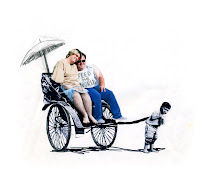His lips were pursed as if his smile were a real liability. Where the mouth’s theatrics were successful, the rest of his face failed. His active brows sharply rising with surprise, thought trains chug chugging along, rerouting themselves with a new destination and new tracks to get there. His unnaturally green eyes darting around, devouring his environment, digesting it through the brows to the brain, and passing its uncontainable agreement, questioning, or disgust along to the once stoic mouth. His brown hair was perfectly in place, in stark contrast to the bulk of his life.
When he was younger, before he felt The Weight, Scott had a laugh that was rich with authentic emotion. Many considered him to be the verifiable definition of a “man-child.” Such was his delight in life, even as a young adult. They envied him for this, but genuinely delighted in his presence: He opened up for others a part of the Self severely constrained by modern society. Conversation with Scott was highly interactive, and while people admittedly come into everything (or nearly everything) with preconceived notions, there was a pervasive theme of transcendence. He very rarely felt satisfied with the status quo, his brain would not allow it: too many contingencies unaccounted for, to many questions still left to pose. In others this quality may have manifested itself differently, but in Scott it served to illuminate the absolute earnestness that he brought with him wherever he went.
Scott Fitzgerald Socrates Porter was born to Laura and Thomas Porter on the day Ronald Reagan was inaugurated as the 40th President of the United States of America. This has no other real significance save the fact that Scott would grow up to have an aversion to most actors (not acting as such, but actors with whom he came into contact) and at the age of six remarked about President Reagan, “Couldn’t an actor just act and pretend to everyone he is a great person?” Smiling, equal parts sadness and joy for she had an inkling of the future, she had said that the President was no different than anyone else: everyone acts differently than they are and proclaims their own greatness to whoever will listen. At age fourteen, Scott would admonish his mother for such a view. He felt that her judgment was much too harsh and unsympathetic to the human condition.
It would be difficult, as well as pointless, to attempt to discern which parent contributed more with respect to Scotts’ disposition and constitution. For they both held the same philosophy of child-rearing: a Daring Honesty stressing the importance of fact-based knowledge tempered by the fact that a type of stoicism tangential to this is an isolation of Reason to itself, therefore denying the fundamental capacity of human beings to feel Love, to experience Beauty. He came to know these as proper nouns always, causing much angst in his adolescent years.
Laura and Thomas named their son as they did, not out of some grandiose vision for their son’s future. No, they thought it reflected as well as any name could. Really, how much could a name hurt? Or help, for that matter. So, they found it pretty arbitrary and decided to pick two of their favorite historical figures, representing pretty fairly the child-rearing dynamic they wished to cultivate. Whether this was done as a symbolism of sorts, we know not. His parents decided on Scott after coming to the conclusion that Socrates carried with it far more expectations and to have a name like that one should choose it.
Neither parent expected the dramatic turn of events that would follow from all of this, years later.
"in the poetry of the poet and in the thinking of the thinker, there is always so much worldspace to share that each and every thing - a tree, a mountain, a house, the call of a bird - completely loses its indifference and familiarity." - martin heidegger
Subscribe to:
Post Comments (Atom)
i, i, i

- steven
- "Seeing that before long I must confront humanity with the most difficult demand ever made of it, it seems indispensable to me to say who I am. Really, one should know it, for I have not left myself "without testimony." But the disproportion between the greatness of my task and the smallness of my contemporaries has found expression in the fact that one has neither heard nor even seen me. I live on my own credit; is it perhaps a mere prejudice that I live? ... I need only to speak with one of the "educated" who come to the Upper Engadine for the summer, and I am convinced that I do not live ... Under these circumstances I have a duty against which my habits, even more the pride of my instincts, revolt at bottom, namely, to say: Hear me! For I am such and such a person. Above all, do not mistake me for someone else!" - Nietzsche, Ecce Homo
No comments:
Post a Comment